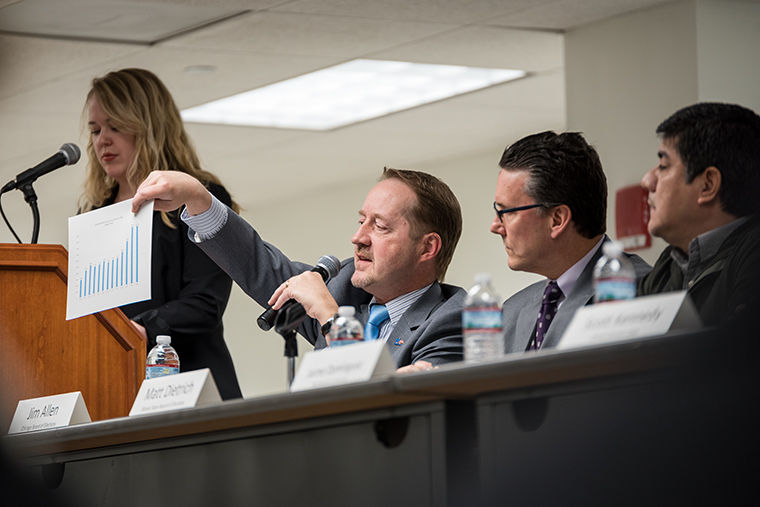Experts analyze primary election results
Jim Allen, communication director for the Chicago Board of Election Commissioners, noticed an up-tick in early and mail-in voting in the 2018 primaries.
April 7, 2018
Illinois’ 2018 primary results are in and experts came together in an April 5 panel to analyze contributing factors to candidate selection.
Hosted by the Illinois Campaign for Political Reform at 69 W. Washington St., panelists discussed the nuanced role of race in politics, the impact of early voting and the state’s early primary date.
Sarah Brune, director of the ICPR and moderator of the event, noted Jesus “Chuy” Garcia’s success in the 7th Congressional District Democratic primary as the sole Latino-majority seat. Brune questioned whether Garcia’s progressive coalition from his unsuccessful 2015 mayoral bid was a force behind other local incumbents losing their positions.
Jaime Dominguez, an assistant professor of Political Science at Northwestern University, said Garcia and other minorities need to continue to expand and diversify their mission.
Dominguez said there is a crack in the “machine politics” in Illinois, and an opportunity to have an inclusive political environment for nontraditional voters to come.
Before the primary, many thought former Democratic gubernatorial candidate Chris Kennedy would win the African-American demographic, Brune said.
But J.B. Pritzker, who won the Democratic ticket for governor in the November general election, received 60 percent of the African-American vote in Chicago, said Scott Kennedy, who runs the Illinois Election Data website.
Shortly before the election, Pritzker’s campaign was on the defensive after private phone calls with Rod Blagojevich, a former Illinois governor now serving 14 years in prison for a conviction of wire fraud, attempted extortion and solicitation of bribes. In the conversation recorded by the FBI and released by the Chicago Tribune Feb. 6, Pritzker advised Blagojevich to fill then President-elect Barack Obama’s former senate seat with Secretary of State Jesse White to take care of the “African-American thing.”
Along with Pritzker, the panel noted the African-American support for State Sen. Kwame Raoul who won the attorney general race.
“The takeaway from this election is that it is worth it for candidates to spend time in those communities because the [African-American] community tends to coalesce around a particular candidate,” Scott Kennedy said. “In this case, it probably provided [Raoul and Pritzker] with the advantage they needed to win.”
Shari Runner, president and CEO of the Chicago Urban League, said the election proved politics are not black and white.
“The monolithic voting bloc of the African-American voter does not exist,” Runner said. “[The voters are] dispersed. It would be wise to recognize that each one of the gubernatorial candidates made sure they had a black running mate.”
Illinois voters are not concerned about race, Runner said. They care about a candidate’s ideals and campaign issues.
“The African-American voting bloc in Chicago is huge, but it doesn’t vote all the time,” Runner said. “We need to get people educated, energized and out to make sure they know who the candidates are there and what is in their best interests [as a voter].”
Carolyn Cosentino, a member of the League of Women Voters, was disappointed in the questions about the African-American vote throughout the panel.
“I was glad [Runner] pointed out that there is no African-American bloc, they are just people,” Cosentino said. “It’s 2018. Come on, folks.”
Jim Allen, a spokesman for the Chicago Board of Election Commissioners, said there was an early voting trend in this year’s primary. In the 2014 primary, there were only 8,200 mail-in votes in Chicago, but that number skyrocketed to nearly 40,000 in 2018.
Matt Dietrich, a public information officer for the Illinois State Board of Elections said pushing the primaries to a later date would help with technical issues in the voting process.
Dietrich also said 75 percent of early votes were Democratic while only 25 percent were Republican this year.
Allen said election officials were not surprised by the large Democratic voter turnout.
“There were high-profile contests on the ballot. When that happens, voters are more compelled to participate,” he said. “The ballot drives turnout. No amount of begging, pleading, or social shaming is going to drive up turnout. “








